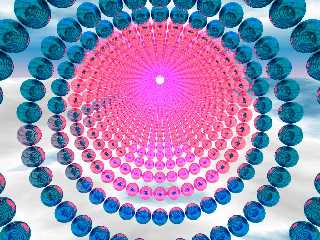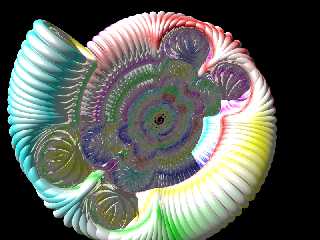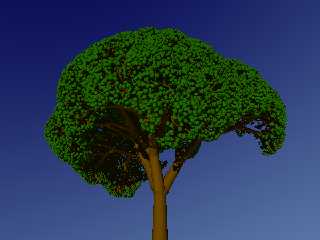 |
 |
|
 |
|
 |
|  |
|  |
|
 |
|
 |
|  |
|  |
|
 |
I'm so glad you liked my pic that I've uploaded another one and now present
you all with a challenge. The goal of these pics is to use as MANY objects
in a scene as possible with as FEW lines of code and with ONLY basic
objects (i.e. not using an external program to model objects).
If anyone is up to the challenge, I'd be interested in seeing the results
with information such as how long they took to render.
Thank you.
James S.
Post a reply to this message
Attachments:
Download 'sky_balls.jpg' (201 KB)
Preview of image 'sky_balls.jpg'

|
 |
|  |
|  |
|
 |
|
 |
|  |
|  |
|
 |
JS wrote:
> I'm so glad you liked my pic that I've uploaded another one and now present
> you all with a challenge. The goal of these pics is to use as MANY objects
> in a scene as possible with as FEW lines of code and with ONLY basic
> objects (i.e. not using an external program to model objects).
>
> If anyone is up to the challenge, I'd be interested in seeing the results
> with information such as how long they took to render.
>
> Thank you.
>
> James S.
>
>
> ------------------------------------------------------------------------
>
I'm up for it :)
Here's my pic, only about a thousand torii. The objects took less than
15 lines of code, and the texture took about 25 :)
...Chambers
Oh, and it took the 3.7 Beta 19 3M 3S on my Athlon XP 1700+.
Post a reply to this message
Attachments:
Download 'torii.png' (535 KB)
Preview of image 'torii.png'

|
 |
|  |
|  |
|
 |
|
 |
|  |
|  |
|
 |
"JS" <bos### [at] yahoo co co uk> wrote:
> I'm so glad you liked my pic that I've uploaded another one and now present
> you all with a challenge. The goal of these pics is to use as MANY objects
> in a scene as possible with as FEW lines of code and with ONLY basic
> objects (i.e. not using an external program to model objects).
>
> If anyone is up to the challenge, I'd be interested in seeing the results
> with information such as how long they took to render.
[...]
I'm pretty sure that eventually somebody is bound to think of
this, but since nobody has spoken up yet, I will. :-) The best
way to create as many objects as possible with as few lines of
code as possible is to use recursive macros (exponential growth).
And highly recursive macros are good for making fractal-like
objects such as trees, so here's one, made from cones and
spheres.
This is rendered with Povray 3.6.1 at a resolution of 600x450.
There are 287361 finite objects in the scene and 2 light sources
(the exact number of objects changes when various parameters
in the scene are tweaked, since I used the rand() function). Max
memory usage was 366MB, which is at the peak of my poor
laptop's capacity. Parsing took 54 seconds, rendering took 4m7s.
I'll post the code if anyone is interested. It's only about 38 lines,
and in interest of conserving space, the only fancy texture is
the sky_sphere and there is actually no ground (the camera
angle is chosen to hide this fact). The code itself can potentially
create much, much, deeper branching, but then my laptop will
run out of memory so the max recursion is 13 levels deep,
branching roughly into 3 (exact number is random) at each
junction. The macro doesn't do any fancy self-intersection
prevention checks, so you might see some self-intersection, but
at least it's not too obvious in the image. :-) uk> wrote:
> I'm so glad you liked my pic that I've uploaded another one and now present
> you all with a challenge. The goal of these pics is to use as MANY objects
> in a scene as possible with as FEW lines of code and with ONLY basic
> objects (i.e. not using an external program to model objects).
>
> If anyone is up to the challenge, I'd be interested in seeing the results
> with information such as how long they took to render.
[...]
I'm pretty sure that eventually somebody is bound to think of
this, but since nobody has spoken up yet, I will. :-) The best
way to create as many objects as possible with as few lines of
code as possible is to use recursive macros (exponential growth).
And highly recursive macros are good for making fractal-like
objects such as trees, so here's one, made from cones and
spheres.
This is rendered with Povray 3.6.1 at a resolution of 600x450.
There are 287361 finite objects in the scene and 2 light sources
(the exact number of objects changes when various parameters
in the scene are tweaked, since I used the rand() function). Max
memory usage was 366MB, which is at the peak of my poor
laptop's capacity. Parsing took 54 seconds, rendering took 4m7s.
I'll post the code if anyone is interested. It's only about 38 lines,
and in interest of conserving space, the only fancy texture is
the sky_sphere and there is actually no ground (the camera
angle is chosen to hide this fact). The code itself can potentially
create much, much, deeper branching, but then my laptop will
run out of memory so the max recursion is 13 levels deep,
branching roughly into 3 (exact number is random) at each
junction. The macro doesn't do any fancy self-intersection
prevention checks, so you might see some self-intersection, but
at least it's not too obvious in the image. :-)
Post a reply to this message
Attachments:
Download 'short01.png' (164 KB)
Preview of image 'short01.png'

|
 |
|  |
|  |
|
 |
|
 |
|  |
|  |
|
 |
"quickfur" <qui### [at] quickfur ath ath cx> wrote:
[...]
> I'm pretty sure that eventually somebody is bound to think of
> this, but since nobody has spoken up yet, I will. :-) The best
> way to create as many objects as possible with as few lines of
> code as possible is to use recursive macros (exponential growth).
> And highly recursive macros are good for making fractal-like
> objects such as trees, so here's one, made from cones and
> spheres.
[...]
Here's another tree generated by my recursive macro (the only
difference is the random seed). This one has 293997 finite
objects and 2 lights. Parsing took 1m6s, and rendering took
5m54s. As you can see, this tree is slightly more spread out.
And oh, BTW, this is on a 1.40GHz Intel Celeron (laptop)
with 500MB RAM. Max memory usage by Povray was 375MB. cx> wrote:
[...]
> I'm pretty sure that eventually somebody is bound to think of
> this, but since nobody has spoken up yet, I will. :-) The best
> way to create as many objects as possible with as few lines of
> code as possible is to use recursive macros (exponential growth).
> And highly recursive macros are good for making fractal-like
> objects such as trees, so here's one, made from cones and
> spheres.
[...]
Here's another tree generated by my recursive macro (the only
difference is the random seed). This one has 293997 finite
objects and 2 lights. Parsing took 1m6s, and rendering took
5m54s. As you can see, this tree is slightly more spread out.
And oh, BTW, this is on a 1.40GHz Intel Celeron (laptop)
with 500MB RAM. Max memory usage by Povray was 375MB.
Post a reply to this message
Attachments:
Download 'short01.png' (184 KB)
Preview of image 'short01.png'

|
 |
|  |
|  |
|
 |
|
 |
|  |
|  |
|
 |
> If anyone is up to the challenge, I'd be interested in seeing the results
> with information such as how long they took to render.
I have made a movie (1minute, 30fps, 640x480) which uses csg. It's made
of a single box from which I deleted thousands of reflective spheres and
they move in all directions. It looks like a living cavern or boiling
cavern. Back in around 2000 I had given it the name: LiquidMind.
I've specialised myself in these kinds of renders. Why because there's
always a better technology (radiosity, isosurfaces, etc) that comes out
and they lack compatibility with other "rendering" systems I use (I work
primarily with OpenGL and 2D SDL these days, using dots, not even lines
or polygons).
I have to say, the difficulty with this challenge is not to have "as
many object" for the "smallest code"; I'll do a single loop with only a
sphere moving around that I might get a nice abstract scene. But the
challenge would be to get away from the abstract, this said, a better
challenge would be to "make something meaningful or semi-realistic with
as many objects as possible and with the smallest code". Now that's a
challenge, it's a real one... I... may not be able to follow this one! ;)
But keep rendering those, will discover all kinds of nice things ahead
(such as spirals, stars, patterns and others)!
Simon
Post a reply to this message
|
 |
|  |
|  |
|
 |
|
 |
|  |
|  |
|
 |
"quickfur" <qui### [at] quickfur ath ath cx> schreef in bericht
news:web.45c2d02a9125cd5bdd5364bf0@news.povray.org...
>
> I'll post the code if anyone is interested. It's only about 38 lines,
> and in interest of conserving space, the only fancy texture is
> the sky_sphere and there is actually no ground (the camera
> angle is chosen to hide this fact). The code itself can potentially
> create much, much, deeper branching, but then my laptop will
> run out of memory so the max recursion is 13 levels deep,
> branching roughly into 3 (exact number is random) at each
> junction. The macro doesn't do any fancy self-intersection
> prevention checks, so you might see some self-intersection, but
> at least it's not too obvious in the image. :-)
>
This is interesting, and I would like to see the code! It's never too late
to learn some clever tricks :-)
Thomas cx> schreef in bericht
news:web.45c2d02a9125cd5bdd5364bf0@news.povray.org...
>
> I'll post the code if anyone is interested. It's only about 38 lines,
> and in interest of conserving space, the only fancy texture is
> the sky_sphere and there is actually no ground (the camera
> angle is chosen to hide this fact). The code itself can potentially
> create much, much, deeper branching, but then my laptop will
> run out of memory so the max recursion is 13 levels deep,
> branching roughly into 3 (exact number is random) at each
> junction. The macro doesn't do any fancy self-intersection
> prevention checks, so you might see some self-intersection, but
> at least it's not too obvious in the image. :-)
>
This is interesting, and I would like to see the code! It's never too late
to learn some clever tricks :-)
Thomas
Post a reply to this message
|
 |
|  |
|  |
|
 |
|
 |
|  |
|  |
|
 |
"Thomas de Groot" <t.d### [at] inter nlDOTnet> wrote:
> "quickfur" <qui### [at] quickfur nlDOTnet> wrote:
> "quickfur" <qui### [at] quickfur ath ath cx> schreef in bericht
> news:web.45c2d02a9125cd5bdd5364bf0@news.povray.org...
> >
> > I'll post the code if anyone is interested. It's only about 38 lines,
> > and in interest of conserving space, the only fancy texture is
> > the sky_sphere and there is actually no ground (the camera
> > angle is chosen to hide this fact). The code itself can potentially
> > create much, much, deeper branching, but then my laptop will
> > run out of memory so the max recursion is 13 levels deep,
> > branching roughly into 3 (exact number is random) at each
> > junction. The macro doesn't do any fancy self-intersection
> > prevention checks, so you might see some self-intersection, but
> > at least it's not too obvious in the image. :-)
> >
>
> This is interesting, and I would like to see the code! It's never too late
> to learn some clever tricks :-)
[...]
Here it is:
http://news.povray.org/povray.text.scene-files/thread/%3Cweb.45c75aae68390bf6dd5364bf0%40news.povray.org%3E/ cx> schreef in bericht
> news:web.45c2d02a9125cd5bdd5364bf0@news.povray.org...
> >
> > I'll post the code if anyone is interested. It's only about 38 lines,
> > and in interest of conserving space, the only fancy texture is
> > the sky_sphere and there is actually no ground (the camera
> > angle is chosen to hide this fact). The code itself can potentially
> > create much, much, deeper branching, but then my laptop will
> > run out of memory so the max recursion is 13 levels deep,
> > branching roughly into 3 (exact number is random) at each
> > junction. The macro doesn't do any fancy self-intersection
> > prevention checks, so you might see some self-intersection, but
> > at least it's not too obvious in the image. :-)
> >
>
> This is interesting, and I would like to see the code! It's never too late
> to learn some clever tricks :-)
[...]
Here it is:
http://news.povray.org/povray.text.scene-files/thread/%3Cweb.45c75aae68390bf6dd5364bf0%40news.povray.org%3E/
Post a reply to this message
|
 |
|  |
|  |
|
 |
|
 |
|  |
|  |
|
 |
uhh
I posted in a new thread a image for the challenge
see in
http://news.povray.org/povray.binaries.images/thread/%3Cweb.45c81a92d6c86b4af5e783670%40news.povray.org%3E/
Post a reply to this message
|
 |
|  |
|  |
|
 |
|
 |
|  |
|  |
|
 |
Thank you very much indeed.
Thomas
Post a reply to this message
|
 |
|  |
|  |
|
 |
|
 |
|  |
|
 |




![]()